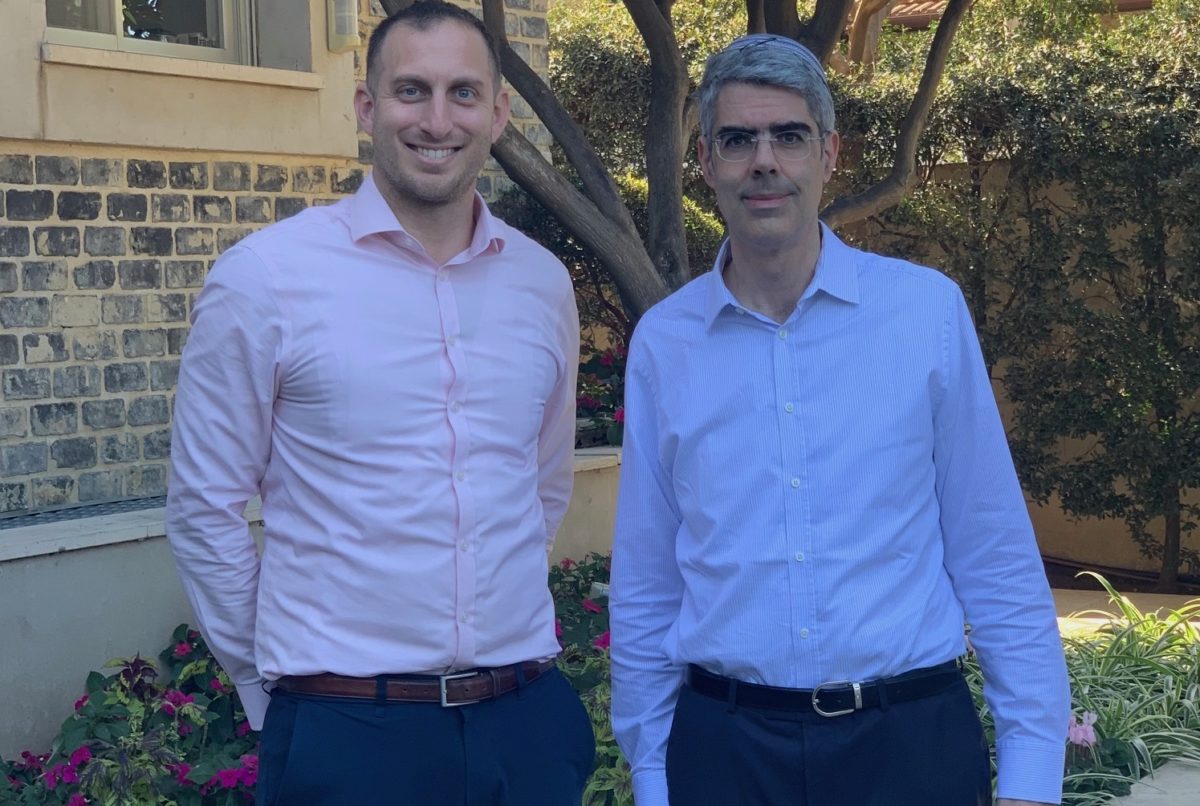Your Daily Phil: The pair behind Israel Impact Partners + More info on JCRIF’s Reset grants
Good Thursday morning!
Ed note: In celebration of Purim, Your Daily Phil will next arrive on Monday. Happy Purim!
From Sara Blakely, the inventor of Spanx, to fashion designer Donna Karan and skincare entrepreneur Katie Rodan, Inside Philanthropy documented the philanthropic giving of 12 self-made Jewish women on Tuesday, noting that while they all give to an array of causes, few of them prioritize those that are explicitly Jewish. The analysis comes as women’s share of the global wealth pool — which was just slightly below a third in 2019 — is predicted to grow by 2% in 2023, according to an April report by Boston Consulting Group.
Of these dozen women, Rodan, with her husband Amnon Rodan, gives to the widest range of Jewish groups, including Chabad, Moishe House, Honeymoon Israel and PJ Library. They describe their backing of programs to support Jews of color in the East Bay area of California, where they live, as a “key initiative,” and announced in January on their website that they had given $180,000 to five area organizations, including a synagogue and OneTable, to develop programming for Jews of color and cultivate them as leaders. In December, the Rodans’ daughter, Elana Schuldt, presented at a Jewish Funders Network’ conference on “Diversity, Equity, and Inclusion in Jewish Philanthropy.”
Barbra Streisand supported the USC Shoah Foundation, and Sheryl Sandberg gave $2.5 million to the Anti-Defamation League in 2019 as a birthday tribute to her parents after the Yom Kippur attack on a synagogue in Halle, Germany.
Other causes favored by the group include the Grameen American Social Business Fund, which provides credit to low-income female businesswomen and attracted Blakely as an early sponsor, and the Met Opera, supported by Bette Midler, who also funds the renovation of New York City public school auditoriums. Novelist Danielle Steel gives to providers of mental health services in honor of her son, who had bi-polar disorder and committed suicide at age 19.
The ask
Startup looks to scale up Israeli nonprofits


Courtesy Israel Impact Partners
Passion. Deep knowledge. Big hearts. The nonprofit sector tends to draw people with these qualities and then promote them into jobs that require business skills like management and finance. Other charities, like UpStart and Leading Edge, have emerged to provide this training in the Jewish communal world; some organizations benefit from pro bono consulting, and some foundations also help shore up their grantees in these areas. Michael Bloch offered that kind of pro bono help during his tenure at global consulting firm McKinsey & Company, where he worked for 23 years — until he decided he wanted to dedicate himself to this mission full-time. He co-founded Israel Impact Partners with Rabbi Benji Levi in early 2021 to consult with nonprofits both in Israel and outside it with the goal of helping them grow their impact. They talked with eJewishPhilanthropy’s Helen Chernikoff about the firm’s origins and goals. This interview has been edited and condensed.
Helen Chernikoff: How did you each come to this work?
Michael Bloch: I worked for 23 years with McKinsey helping corporations grow and innovate, having an amazing time, working at a level I could never have imagined, traveling the world. At one point I got a bit tired of traveling the world. I was on a plane every week. I was hungry for meaning. I’d been exposed to the world of nonprofits, and I realized there was so much nonprofits could learn from the business world. I spoke with 130-plus people in the social sector in Israel and the U.S. about where I could contribute, and discovered that funders were frustrated that nonprofits weren’t growing at the desired rate. Israel is smaller; there is more of a chance to make a difference. It will be another 23-year journey. I want to learn, and I want to contribute.
Benji Levi: I never thought I would come into this space. I was on the path growing up to go into the corporate world, but at 26 I was invited to run Moriah College, a 2,400-student Modern Orthodox day school, the school that I went to in Sydney, Australia. I did that for six years, and then I went to Israel to become the CEO of Mosaic United, which is a joint venture between the state of Israel and the Jewish world to develop identity and education initiatives for people ages 18 to 35. I developed relationships with funders there. So Michael has experience in the for-profit space, and I come from the community-building side. We have complementary skill sets.
HC: You’ll be serving charities. Are you a charity yourselves?
MB: We will be a “no-profit” company. We are not a charity. We intend to operate with the efficiency of a company, and pay people commercial market rates to get access to the best talent. But we aim to reinvest our profits to benefit the social sector, especially by initiating sector-wide initiatives like helping nonprofits figure out how to measure their impact.
Reset explainer
More information on JCRIF’s Reset grants


iStock
Earlier this week, eJewishPhilanthropy reported, “A group of philanthropies that has helped to buoy Jewish organizations during the pandemic believes that now is the time to start thinking about what post-pandemic Jewish life will look like — and they’re willing to put up to $10 million behind big ideas.”
Today, in a follow-up opinion piece Felica Herman writes, “We know there are also many questions emerging about the new Reset grants, so we want to offer some guidance.”
Nuts and bolts: The grants are for up to $10 million to be distributed over up to 5 years. The $10 million number is meant to encourage applicants to think big – but we will absolutely consider applications for much smaller amounts. This is not a grant program intended only for big organizations; it is a grant program intended to support big, game-changing ideas. Big ideas can come from organizations of all sizes.
Big ideas: By “big ideas,” we are talking not about single programs, no matter how excellent, but about ways to re-envision, realign and restructure Jewish organizations and communities. Big ideas are complicated and they’re not silver bullets. They often take many partners, and although we’re not mandating collaborative proposals, we imagine that most successful proposals will include organizational partnerships.
Clubhouse conversations
Using the data we already have is the $10 million dollar idea


Photo illustration by Jakub Porzycki/NurPhoto via AP
This past Monday evening, eJewishPhilanthropy, along with representatives of some of the largest donors in the Jewish community, hosted a Clubhouse discussion on the new Reset grants, which will fund efforts to reimagine Jewish life. In an opinion piece, Danielle Ames Spivak, expands on her Clubhouse comments.
Intro: As CEO of the American Friends of the Israel Philharmonic, the impossibility of hosting in-person concerts, and touring internationally, made us suddenly mute. Having lost our voice, we needed to find another avenue for reaching our audience. So we leaned into digital — and data. Audiences around the world streamed into our digital concerts. They visited our website, reading fresh content we created. They donated to help our musicians because we built relationships with them through email and social media.
Data: What I learned from this crisis is that infrastructure changes are needed to access the data already at our fingertips, to build a stronger tomorrow. And, we need to start those infrastructure changes today. We can learn about resilience and agility from for-profit companies, especially e-commerce.
Big question: We no longer need a brilliant idea to reinvigorate a specific Jewish movement, cause or even the Jewish community as a whole. We have technology today that can literally do it for us, while we are sleeping. Every Jewish institution has priceless data, the question is – why aren’t we utilizing it more effectively?
Community Change
Creating a roadmap to more collaborative Jewish communities


iStock
Susanna Rothschild, Tristan Dorfman, Rabbi Anthony Knopf,
and David Wallach write in an opinion piece about collaboration and shared processes.
Background: The COVID-19 pandemic has afforded our community of Montreal the much-needed opportunity to think deeply and critically about how to best facilitate collaboration at a time when organizational structures and viability are shifting dramatically.
Challenges: Thorough field research on the topic revealed two main obstacles to successful collaboration: The first challenge is organizational fears; collaboration can be seen as a threat to an organization’s own identity, particularly when organizations are struggling to stay sustainable and relevant. Secondly, fear surrounding competitiveness and conflict of interest may also arise; organizations may worry about “losing” constituents to another organization which offers similar programs.
Outcome: After extensive research failed to locate existing resource guides on successful collaboration, and in an effort to create shared processes amongst the Jewish community’s professionals, we used field research and our own experience to develop one ourselves.
Worthy Reads
Lights On: Many in the philanthropic sector bemoan funders’ tendency to provide project-specific support instead of general operating support, but a fundraising coach steps up at the Center for Effective Philanthropy’s website has stepped up in their defense — even though he knows some will consider it “heresy.” The fix is to help funders reframe these grants, and think of them more like a consumer product, whose price includes overhead costs, writes Rodney Christopher, a fundraising coach, at the Center for Effective Philanthropy’s website. [CenterEffectivePhilanthropy]
Seeming Contradiction: Employees are feeling happy and burnt-out at the same time, according to a new survey from Glint, a human resources platform. Employee happiness at work rose 5.4% in December 2020 compared with December 2019, according to the survey of 9 million people, conducted on LinkedIn, which owns Glint. A Glint analyst said that indicator might have risen because many people found work a refuge from the chaos of the pandemic. However, burnout has also continued to rise, increasing by 4% from a peak in August, when about 5% of survey responses continued burnout signals, like feelings of disconnection from colleagues. [Glint]
Embracing Others: Purim repudiates evil and intolerance by mocking them, yet “Hamanism” — the fear of difference — thrives, writes Andres Spokoiny, the CEO of the Jewish Funders Network, in eJewishPhilanthropy. It’s this fear that’s at the core of every authoritarian regime, and fueling hatred on both the right and left. “We tend to blame the fraying of our social ties on ‘polarization.’ But the problem is not that we are polarized but that we are ‘sorted,’” he concludes. [eJP]
New Priorities: The Jewish world’s biggest donor to the cause of disability and inclusion has withdrawn its funding from the area, leaving the future of the foundation unclear. The Ruderman Family Foundation said in September that it felt it had achieved its goal of initiating social change around disability, and now would shift its focus in a transparent way, reports Asaf Shalev in JTA. Jay Ruderman said disability work would find its supporters: “Once a program is established and becomes a central value of the community, it’s very difficult for those programs to go away.” [JTA]
Community Comms
Apply! Want to join the team at Jewish Insider/eJewish Philanthropy? We’re looking for a top-notch philanthropy editor. Learn more here.
Be featured: Email us to inform the eJP readership of your upcoming event, job opening, or other communication.
Word on the Street
An expanded partnership between the Victorian Government and Gandel Philanthropy will lead tosecondary schools receiving support to strengthen their teaching about the Holocaust and antisemitism… The U.K.’s Dangoor Family has pledged £2 million from The Exilarch’s Foundation, the family’s charitable foundation, to the Royal United Services Institute for Defense and Security Studies, the oldest defense and security think tank in the world… Israeli genealogy company MyHeritage has announced they will be acquired by private equity firm Francisco Partners… United Hatzalah will indefinitely suspend unvaccinated volunteers… The Israeli Ministry of Health has authorized the distribution of Covid-19 vaccines to 5000 Masa Fellows currently in Israel…OneTable released its 5th PAUSE episode featuring three millennials interviewing their grandparents about intimacy and Shabbat.
Pic of the Day


Courtesy PJ LIbrary
A PJ Library reader in Winnipeg, Canada uses the book Purim Masquerade to celebrate the holiday, which starts tonight. Children can read the story, and also use the book as a mask.
Birthdays


Photo LadyCiaoCiao / Wikimedia Commons
2013 U.S. national figure skating champion, Max Aaron…
Former talk show host, Sally Jessy Raphael… Owner of the Chicago White Sox and the Chicago Bulls, Jerry M. Reinsdorf… The first-ever CEO of United Jewish Communities, Stephen Solender… Science and medicine reporter for the New York Times, Gina Bari Kolata… Visiting scholar at NYU, formerly CEO of the Jewish Council for Public Affairs, Steve Gutow… Jerusalem-based attorney and chairman of Republicans Overseas Israel, Marc Zell… Israel’s Minister of Foreign Affairs, Gabi Ashkenazi… Opinion columnist and podcast contributor for The New York Times, Andrew Rosenthal… VP of communications at CNN, Barbara Levin… Senior fellow at DC’s Ethics and Public Policy Center, Mona Charen… CEO of the Jewish Federation of Greater Buffalo, Rob Goldberg… Co-President of Paterson, New Jersey-based JNS-SmithChem, LLC, Michael F. Smith… Vice Chairman of Morgan Stanley, Thomas Richard Nides… Mayor of Burlington, Vermont, Miro Weinberger… Founder of “News Not Noise,” Jessica Sage Yellin… Pulitzer Prize-winning journalist, now the director of news curation for Facebook, Anne Elise Kornblut… Travel planner, previously SVP of marketing and communications at NBC News, Lauren Raps… Comedian, actress and writer, Chelsea Joy Handler… Actress, author and producer, known for roles in NBC’s “Parks and Recreation” and Fox’s “Boston Public,” Rashida Jones… Managing director of Covenant Wines in Berkeley, California, Sagie Kleinlerer… Assistant director at San Francisco-based EUQINOM Gallery, Lyla Rose Holdstein… Actor known for his role in Fox’s “Malcolm in the Middle,” Justin Berfield… CNN’s next Jerusalem correspondent, Hadas Gold…








